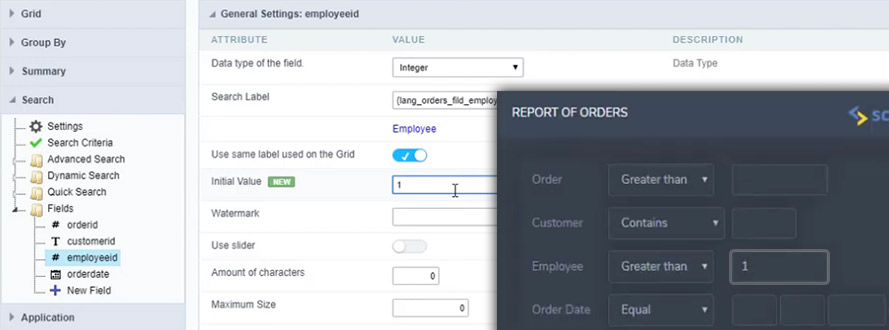

‘REMOTE_ADDR’ returns the client’s IP addressĮxample 1: This example illustrates how to get Client’s IP Address using $_SERVER. These superglobals store information in the form of associative-array, and here we are going to fetch the ‘REMOTE_ADDR’ key of the $_SERVER associative array to get the client’s IP Address. Superglobal variables are the predefined variables which are always accessible. How to get the IP address of the connected client in PHP: $_SERVER is a PHP superglobal variable which holds information about the header, path and script locations. IP address keeps on changing time to time.
#SCRIPTCASE ARRAY MAC#
MAC address is used by the data-link layer to route a data packet from source to destination.Īn Internet Protocol(IP) address also known as a logical address is given by the internet service provider(ISP) which uniquely identifies a system over the network. It is printed on the NIC(Network Interface Card) and is globally unique for every networking device. MAC is the abbreviation of “Media Access Control” and it is a 48-bit physical address associated with every networking device.
#SCRIPTCASE ARRAY CODE#
How to execute PHP code using command line ?.How to Upload Image into Database and Display it using PHP ?.How to check whether an array is empty using PHP?.key() returns the index element of the current array position. How to delete an array element based on key in PHP? PHP: How to get last key in an array A solution would be to use a combination of end and key (quoting) : end() advances array 's internal pointer to the last element, and returns its value.How to pop an alert message box using PHP ?.Function overloading and Overriding in PHP.When to use static vs instantiated classes in PHP?.PHP | Get PHP configuration information using phpinfo().PHP | geoip_country_code_by_name() Function.How to get visitors country from their IP in PHP ?.How to get client IP address using JavaScript ?.How to get the MAC and IP address of a connected client in PHP?.How to Get Local IP Address of System using PHP ?.How to identify server IP address in PHP ?.ISRO CS Syllabus for Scientist/Engineer Exam.ISRO CS Original Papers and Official Keys.GATE CS Original Papers and Official Keys.We can use the operator contains to check whether a powershell string array includes a string word or not. "Hello World" -clike "*World" # return True Check Array Contains String – Ignore Case "Hello World" -like "*World" # return True Endswith – Case-Sensitive "Hello World" -clike "*world" # return False "Hello World" -like "*world" # return True "Hello World" -clike "Hello*" # return True Endswith – Ignore Caseįor ends with check, we need to put the wildcard character ( *) at the start of the string. "Hello World" -like "Hello*" # return True Startswith – Case-Sensitive "Hello World" -clike "hello*" # return False "Hello World" -like "hello*" # return True We can use the same operator “like” for starts with comparison by just putting the wildcard character ( *) at the end. "Hello World" -clike "*World*" # return True Startswith – Ignore Case "Hello World" -clike "*world*" # return False To perform a case sensitive comparison just prefix the word “c” with like operator (“clike”). Powershell array object includes ('contains') a particular object Contains Check – Case-Sensitive "Hello World" -like "*World*" # return True Note: You can not use the comparison operator contains to check the contains string, because it's designed to tell you if a "Hello World" -like "*world*" # return True We can use the -like operator for contains check with case insensitive operation. "Hello World" -ceq "Hello World" # return True Contains Check – Ignore Case "Hello World" -ceq "hello world" # return False


"Hello World" -ieq "hello world" # return True Equal Check – Case-SensitiveĪs the normal powershell -eq operator is designed to perform case insensitive comparison, you may need to enforce case-sensitive string compare in some cases, for this case you can use the operator -ceq which compare two string values with case sensitive check. The usage of this operator is very less because most people use -eq which does the same job. "Hello World" -eq "Hello World" # return TrueĮven though the -eq operator performs string comparison in case-insensitive way, you may still want to ensure a case insensitive comparison for some cases, in that place you can use the operator -ieq. "Hello World" -eq "hello world" # return True The normal powershell -eq operator is designed to perform case insensitive comparison and it will ignore the case while comparing the string values. If($strVal -eq 'hello world') Equal Check – Ignore Case You can use the below examples both in IF statement and Where-Object. So in the post, I am going to list the set of samples for string comparison. We all know this is an easy job, but sometimes we need to think the comparison check is actually considering the case-sensitive or ignore case. I am also worked with string values and used lot of string compare checks in my scripts. Always there is more amount of chance to work with a string value in Powershell.


 0 kommentar(er)
0 kommentar(er)
